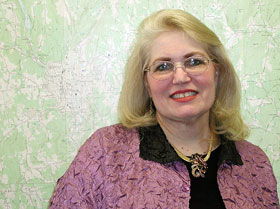  |
| HOME | THIS ISSUE | CALENDAR | GRANTS | BACK ISSUES | < BACK | NEXT > |
Women starting companies to sidestep glass ceiling, researcher saysby Sherry Fisher - September 18, 2006 | ||||
|
Tired of trying to reach the top of the corporate ladder, more and more highly skilled women are starting their own companies, says communications professor Terry DiRusso. "They're smart, savvy, ingenious women who could, over time, make some cracks in the glass ceiling, but instead they're going another route," says DiRusso, an adjunct professor at the Torrington Campus, who has examined and evaluated the research on obstacles facing women in the American workplace. She was recently invited to present her research at an Oxford University round table. Concentrating her attention on studies done in the past five years, she focuses on the issues of equal pay and equal chance for advancement. "There was so much information available on these two topics, it was overwhelming," says DiRusso, who would also have liked to include harassment issues. Along with her teaching responsibilities at UConn, DiRusso just retired after 35 years teaching eighth-grade language arts. She is also the author of several murder mysteries. She says equal pay and equal opportunity for advancement still elude women, and the situation won't be getting better any time soon. "Women currently earn 76 cents on average to a man's dollar, and women, on average, earn 44 cents to a man's dollar over their lifetime," she says. Laws dating back to the 1960s haven't changed the situation much for women. "In the research, I gave a historical perspective of all the laws governing equal pay and equal opportunity for women in the workplace in the United States," DiRusso says. "At the rate we're going, it's going to be another 50 years before equal pay is a reality. This is sad. We've gotten practically nowhere." The lack of equal opportunity for women to advance in the workplace - termed 'the glass ceiling' in 1985 by the Wall Street Journal - is "still very prevalent," DiRusso says. Her paper cites the findings of the U.S. government-appointed 1995 Glass Ceiling Commission: 45.7 per cent of American jobs and 50 percent of master's degrees are held by women; yet 95 per cent of senior managers are male, and female managers earn 68 percent of what their male counterparts make. DiRusso says in 2004 a cultural shift took place. "An amazing number of women, about 400 a day, started opening their own businesses. Instead of battling city hall, they've taken another route. They're successful in businesses from bakeries to law offices to investment corporations, and they're doing well. It's going to take them a while to get into the Fortune 500 and 1000, but they're getting there."
She thinks a number of factors came together to prompt the change. "Baby boomers in their 50s, nine years of Federal Glass Ceiling Commission yielding little effect, laws not being enforced. But really the research offered no specific reason for that being the year. The trend has continued, but not as dramatic as the numbers of 2004." Another issue, the "maternal wall," has been problematic for women in the workplace. "In many cases, when women return to work after having a baby, they are devalued, and in many cases degraded," she says. "One woman who was about to become a partner in a law firm came back after having a baby and was given paralegal responsibilities. The woman said during an interview, 'I really wanted to tell them that I had a baby, not a lobotomy.' "She took a group of female lawyers, left, and opened her own law firm." When women look for jobs after having a baby, they are considered not to be reliable workers, DiRusso says. "The research showed that women with babies are seen as limited workers - people who can't travel and will have problems with overtime commitments. Men don't have that problem. In fact, they're seen as more reliable if they have a family. They're seen as more steadfast and more dependable." She notes that 49 percent of women earning $100,000 or more have no children. "The research seems to be saying, if you want to earn the big bucks, you can't have kids," she says. When women start their own businesses, she adds, they do "all the things their former employers assumed they wouldn't do: putting in long hours, traveling, finding ways to cover home duties and child responsibilities and still managing that whole process." DiRusso quotes U.S. Rep. John Dingell of Michigan as saying that the price of a family should not be a woman's career. "I like his approach," she says. "This is costing American families. Women are working tremendous hours and they're still making less. The time away from their families is yielding less than appropriate compensation." |
| ADVANCE HOME UCONN HOME |

